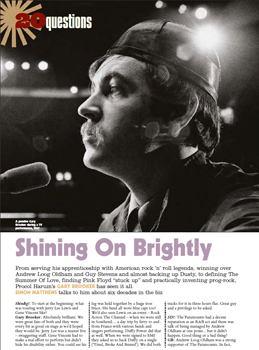Shining
on Brightly
From serving his apprenticeship with American rock ’n’ roll
legends, winning over Andrew Loog Oldham and Guy Stevens and almost backing up
Dusty, to defining The Summer Of Love, finding Pink Floyd “stuck up” and
practically inventing prog-rock, Procol Harum’s GARY BROOKER has seen it all.
Shindig!
01
To start at the beginning: what was touring with Jerry Lee Lewis and Gene
Vincent like?
Gary Brooker
Absolutely brilliant. We were great fans of both and they were every bit as good
on stage as we’d hoped they would be. Jerry Lee was a master live – swaggering
stuff. Gene Vincent had to make a real effort to perform but didn’t hide his
disability either. You could see his leg was held together by a huge iron brace.
His band all wore blue caps too! We’d also seen Lewis on an event – ‘Rock across
the Channel’ – when we were still in Southend… a day trip by ferry to and from
France with various bands and singers performing. Duffy Power did that as well.
When we were signed to EMI they asked us to back Duffy on a single (Tired,
Broke and Busted). We did both tracks for it in three hours flat. Great guy
and a privilege to be asked.
02 The Paramounts had a decent reputation as an R&B act and there was talk of being managed by Andrew Oldham at one point ... but it didn’t happen. Good thing or a bad thing?
Andrew Loog Oldham was a strong supporter of The Paramounts. In fact, both myself and Robin Trower played in The Andrew Loog Oldham Orchestra as well. I remember one session with both Jimmy Page and Julian Bream on guitar parts. Andrew would throw all these strange people together to make those records – he really wanted to be Phil Spector. But we were never in line to be managed by him.
03 By early 1966 The Paramounts had been dropped by EMI and were being handled by Page One, alongside The Troggs. Did the group record anything for Page One?
No – we never did anything with Page One. We recorded for EMI right down to the point the group disbanded. Our last session with them was Freedom (a Charlie Mingus spoken poem) and a cover of Monday, Monday done in the style of Ramsey Lewis. By summer ’66 we were being used as a backing band by Sandie Shaw and we broke up after a tour of Germany backing Chris Andrews.
04 When did you first meet Guy Stevens? Was he ever considered as a possible producer?
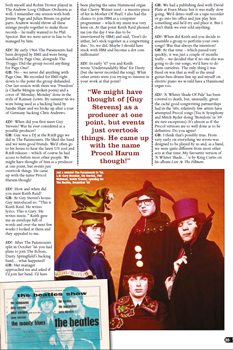 Guy was a DJ at the R&B gigs we did in The Paramounts. He
liked the band and we were good friends. We’d often go to his house to hear the
latest US soul and R&B releases – which of course he had access to before most
other people. We might have thought of him as a producer at one point, but
events just overtook things. He came up with the name Procol Harum though!
Guy was a DJ at the R&B gigs we did in The Paramounts. He
liked the band and we were good friends. We’d often go to his house to hear the
latest US soul and R&B releases – which of course he had access to before most
other people. We might have thought of him as a producer at one point, but
events just overtook things. He came up with the name Procol Harum though!
05 How and when did you meet Keith Reid?
At Guy Steven’s [sic] house. Guy introduced us: “This is Keith Reid. He writes lyrics. This is Gary. He writes music.” Keith gave me an envelope full of words and over the next few weeks I looked at them and they appealed to me.
06 After The Paramounts split in October ’66 you had plans to join The Echoes, Dusty Springfield’s backing band… what happened?
Her manager approached me and asked if I’d join her band. I’d have been playing the same Hammond organ that Cherry Wainer used – a massive piece of kit in Mother of Pearl. I also had the chance to join IBM as a computer programmer – which my mum was very keen on. At that point Keith Reid phoned me (on the day I was due to be interviewed by IBM) and said, ‘Don’t do either, let’s stick together as a songwriting duo.’ So, we did. Maybe I should have stuck with IBM and become a dot com millionaire!
07 In early ’67 you and Keith wrote Understandably Blue for Dusty (but she never recorded the song). What other artists were you trying to interest in your work at that point?
We had a publishing deal with David Platz at Essex Music but it was really slow going. We’d demo stuff on a tape recorder or go into his office and just play him something and he’d try and place it. But I don’t think we ever sold anything.
08 When did Keith and you decide to assemble a group to perform your own songs? Was that always the intention?
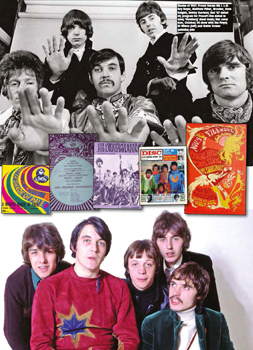 At that time – which passed very quickly, it was just a
couple of months really – we decided that if no one else was going to do our
songs, we’d have to do them ourselves. The only thing I was fixed on was that as
well as the usual guitar-bass-drums line up and myself on electric piano we
would have a Hammond organ too.
At that time – which passed very quickly, it was just a
couple of months really – we decided that if no one else was going to do our
songs, we’d have to do them ourselves. The only thing I was fixed on was that as
well as the usual guitar-bass-drums line up and myself on electric piano we
would have a Hammond organ too.
09 A Whiter Shade of Pale has been covered to death, but, unusually, given the caché [sic] good songwriting partnerships had in the ’60s, relatively few artists have attempted Procol songs (Tea & Symphony and Mitch Ryder doing Boredom in ’69 are rare exceptions). It’s almost as if the Procol versions are so well done as to be definitive. Do you agree?
I think that’s possibly true. From very early on everything we wrote was designed to be played by us and, as a band, we were quite different from most other acts at that time. My favourite version of A Whiter Shade… is by King Curtis on his album Live At The Fillmore.
10 The first Procol Harum line-up did some amazing gigs: debuting at The Saville Theatre on 4 June ’67 with The Jimi Hendrix Experience (as the support act!) and Denny Laine’s Electric String Band, then UFO with The Smoke on 9 June, The Marquee on 12 June supported by Timebox and rounding off the month at The Roundhouse with The Crazy World of Arthur Brown, The Yardbirds and The Social Deviants. On the face of it, fabulous stuff, but what was the catalyst for the July ’67 line-up and management changes?
Hendrix headlined – he’d had more hits than us, even though we were #1 at that point. I remember him at that show… he just started playing Sgt Pepper’s Lonely Hearts Club Band in the middle of his set without telling Mitch and Noel! The issue was everything was happening much quicker than we thought it would, before we’d put down the foundations the group needed. When we did A Whiter Shade… Denny Cordell, who produced, didn’t even use our (then) drummer Bobby Harrison. Bill Eyden from The Harry South Big Band and Tubby Hayes actually plays on the version that was released. The changes that happened in July ’67 were down to Keith and myself sorting out the direction we wanted to take, and having a bit more time to think about that.
11 How hard did Deram try to keep the group in ’67 and why the switch to Regal Zonophone? Was there an offer from Island?
The band as such was never signed to Deram. Our publisher David Platz had a separate deal with them, and so did Denny. In mid-’67 they decided to head to Regal Zonophone, taking The Move with them too, and we went along at the same time. Guy Stevens was at Island then, producing Art, but a deal with them never came together. It was just something in the ether for a couple of weeks.
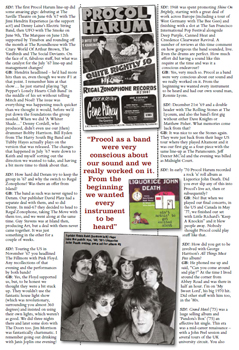 12
Touring the US
in November ’67 you headlined The Fillmore with Pink Floyd. Any recollections of
that evening and the performances by both bands?
12
Touring the US
in November ’67 you headlined The Fillmore with Pink Floyd. Any recollections of
that evening and the performances by both bands?
Yes, the Floyd supported us, but, to be honest we thought they were a bit stuck up. They wouldn’t use the fantastic house light show (which was revolutionary, surrounding you almost 360 degrees) and insisted on using their own lights, which weren’t as good. We did three nights there and later some slots with The Doors too. Jim Morrison was fantastically charismatic. I remember going out drinking with Janis Joplin one evening!
13 1968 was spent promoting Shine on Brightly, starting with a great deal of work across Europe (including a tour of West Germany with The Bee Gees) and finishing with a slot at The San Francisco International Pop Festival alongside Deep Purple, Canned Heat and Creedence Clearwater Revival. A number of reviews at this time comment on how gorgeous the band sounded, live. Even the drums are perfect. How much effort did having a sound like this require at the time and was it a conscious endeavour?
Yes, very much so. Procol as a band were very conscious about our sound and we really worked on it. From the beginning we wanted every instrument to be heard and had our own sound man, Ronnie Lyons.
14 21 December’69 and a double header with The Rolling Stones at The Lyceum, and also the band’s first gig without either Dave Knights or Matthew Fisher. What memories come back from that?
It was nice to see the Stones again. They were just back from their huge US tour where they played Altamont and it was our first gig as a four-piece with the same line-up as The Paramounts. Jeff Dexter MC’d and the evening was billed as Midnight Court.
15 In early ’70 Procol Harum recorded a rock ’n’ roll album as Liquorice John Death. Did you ever slip any of this into Procol’s live act, then or subsequently?
No! But when we played our final concerts, in the US and Canada in May ’77, we finished our set with Little Richard’s Keep a Knockin’ and it blew people away. Nobody thought Procol could play stuff like that.
16 How did you get to be involved with George Harrison’s All Things Must Pass album?
He phoned me up and said, “Can you come around and play?” At the time I lived around the corner from Abbey Road and was there in half an hour. I’m on My Sweet Lord, his big 1970 hit. Did other stuff with him too, in the ’80s.
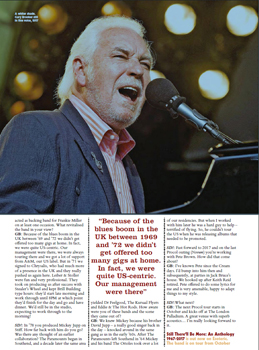 17
Grand Hotel
(’73) was a huge selling album and Pandora’s Box (’75) an effective hit
single. This era was a mid-career renaissance – with a John Peel session and
several tours of the UK university circuit. You also acted as backing band for
Frankie Miller on at least one occasion. What revitalised the band in your view?
17
Grand Hotel
(’73) was a huge selling album and Pandora’s Box (’75) an effective hit
single. This era was a mid-career renaissance – with a John Peel session and
several tours of the UK university circuit. You also acted as backing band for
Frankie Miller on at least one occasion. What revitalised the band in your view?
Because of the blues boom in the UK between ’69 and ’72 we didn’t get offered too many gigs at home. In fact, we were quite US-centric. Our management were there, we were always touring there and we got a lot of support from A&M, our US label. But in ’71 we signed to Chrysalis, who had much more of a presence in the UK and they really pushed us again here. Leiber and Stoller were fun and very professional. They took on producing us after success with Stealer’s Wheel and kept Brill Building-type hours: they’d start late morning and work through until 8pm at which point they’d finish for the day and go and have dinner. We’d still be in the studio, expecting to work through to the morning!
18 In ’78 you produced Mickey Jupp on Stiff. How far back with him do you go? Was there any thought of an earlier collaboration? The Paramounts began in Southend, and a decade later the same area yielded Dr Feelgood, The Kursaal Flyers and Eddie & The Hot Rods. How aware were you of these bands and the scene they came out of ?
We knew Mickey because his brother David Jupp – a really good singer back in the day – knocked around in the same gang as us in the early ’60s. After The Paramounts left Southend in ’64 Mickey and his band The Orioles took over a lot of our residencies. But when I worked with him later he was a hard guy to help – terrified of flying. So, he couldn’t tour the US when he was releasing albums that needed to be promoted.
19 Fast forward to 2017 and on the last Procol outing (Novum) you’re working with Pete Brown. How did that come about?
I’ve known Pete since the Cream days. I’d bump into him then and subsequently, at parties in Jack Bruce’s house. We hooked up after Keith Reid retired. Pete offered to do some lyrics for me and is very amenable, happy to adapt things to my style.
20 What next?
The next Procol tour starts in October and kicks off at The
London Palladium. A great venue with superb acoustics … I’m really looking
forward to it.
Still There’ll Be More: An Anthology 1967–2017 is
out now on Esoteric. The band is on tour from October
